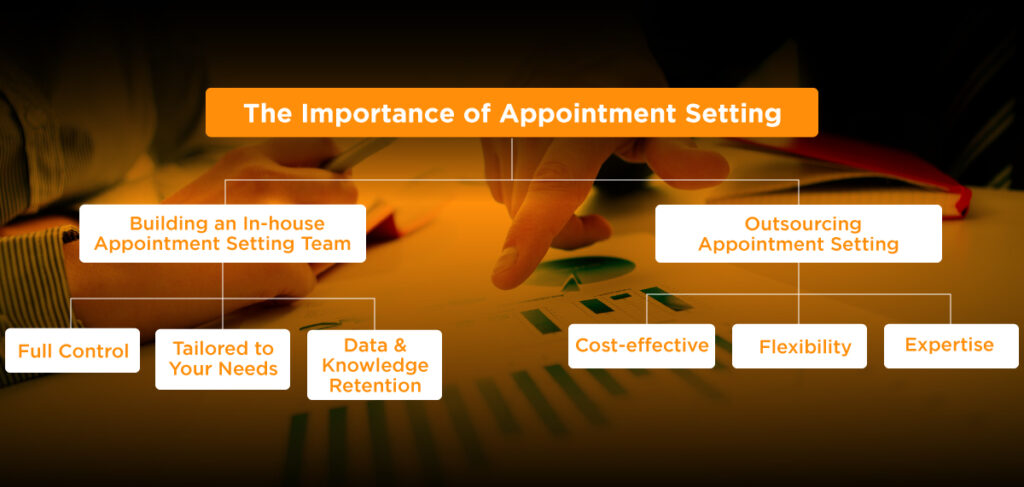How do B2B appointment-setting strategies improve overall time management?
Effective time management is essential in the world of business-to-business sales. Because every minute counts towards setting appointments, nurturing leads, and closing deals. Thus, B2B appointment-setting strategies become the cornerstone of improving overall time management. B2B appointment setters reduce most of the time and workload of the sales team. To do so, these schedulers research prospects, identify leads, utilize technology and automation, and thus set appointments.

Businesses not only enhance the chances of conversion but also streamline overall time management efforts. Today, we will delve into how B2B appointment-setting strategies play a significant role in improving time management across various aspects of the sales process.
What Is B2B Appointment Setting?
A B2B appointment is a sales strategy and process where a business focuses on identifying prospects, contacting them, and scheduling appointments with quality leads or decision-makers.
The ultimate goal is to engage with the prospects, propose the service or product, and ultimately move them closer to making a purchase or closing the deal. While doing so, appointment setters reduce the time and workload of businesses. The sales teams can prioritize their activities more effectively.
Importance Of B2B Appointment Setting Strategies For Improving Time Management
B2B appointment setting is important for time management because it helps sales teams concentrate their efforts on the right task. Hiring B2B appointment setters results in better overall time management and improved sales efficiency. This results in higher revenue and the expansion of the company.

B2B appointment-setting strategies prioritize and target high-potential leads. This means the sales team can spend less time chasing unqualified or low-value leads. This lets them focus on their efforts where they need more attention. Traditional cold calling is time-consuming to reach out to thousands of calls, yet it leads to numerous rejections. With the B2B appointment setting, businesses get the chance to contact prospects only who have shown some level of interest or are qualified. This minimizes wasted time from unqualified leads.
When appointments are set, the conversion rates tend to be higher because there are only qualified leads who are somehow interested in the product or service. This means the time spent on appointments is more likely to lead to successful sales and productive use of time.
At this moment, your warm leads are likely to sign a contract with your business. You should be prepared with contract automation, as it'll help you save significant time, effort, and work hours. B2B appointment setters rely on data analysis and optimize their strategies continually. By identifying what works and what doesn't, companies can fine-tune their approach to maximize results and minimize wasted time.
B2B appointment setting seamlessly integrates with the overall sales process. This alignment allows for a smoother transition from setting appointments to conducting sales pitches, minimizing downtime and improving overall time efficiency.
B2B Appointment Setting Strategies To Improve Time Management
B2B appointment-setting strategies enhance time management by precisely targeting potential clients and reducing time spent on unqualified leads. These appointment schedulers streamline the sales process and adapt to automating repetitive tasks like follow-ups and appointment scheduling. All these save valuable sales team hours.
They get data-driven insights from utilizing these strategies effectively and make the best use of time and resources. When researching online, you will encounter thousands of strategies. But not all are effective, and you may get confused about which to choose. Here, we are discussing nine steps that will surely flourish your B2B appointment-setting efforts.
1. Identifying And Targeting Prospects
B2B appointment setting starts with identifying and targeting the right prospects. For this schedule, setters first make a target customer profile, then seek the leads that match the profile. By doing so, they only focus on high-potential leads and decision-makers within businesses that align with their offerings. Ultimately, this first strategy step eliminates wasted time on unqualified leads and cold calling.
2. Utilize Technology And Tools For Automation
Appointment setters stay updated with modern automation tools and technology. B2B appointment setters utilize software like CRM (Customer Relationship Management) or other marketing automation tools. This software can automate many time-consuming or repetitive tasks, such as lead tracking, follow-up emails, and appointment scheduling. This mitigates manual data entry and administrative work. The sales rep can spend more time on productive activities.
3. Researching Prospects And Pre-Qualification
One of the fundamental aspects of an effective B2B appointment setting is the rigorous qualification of leads. Not all leads are equal; some may be more likely to convert than others. So, the qualification process is important.

Here, the B2B appointment setter implements a lead scoring system to ensure they have a genuine interest, budget, and authority to make a purchasing decision. For this, they research prospects, industry, pain points, foals, and needs. Also, study the competitors so they can pitch to businesses according to their specific needs. This ensures they are focusing on the most promising prospects.
4. Developing A Compelling Sales Pitch
Effective appointment-setting strategies involve crafting a clear and compelling speech or value proposition both for B2B and B2C cold calling services. The script includes all the information so the prospects can understand the benefits of meeting with the company. This makes them willing to allocate time for appointments.
B2B schedule setters also segment leads into different personas. This segmentation lets them personalize outreach. Personalization makes the outreach relevant and engaging. This increases the chances of securing appointments faster than manual outreach.
5. Appointment Confirmation And Reminder Systems
Automating the appointment setting, confirming the meeting, and sending reminders can save huge amounts of time. Here, the B2B appointment setters use this automated confirmation and reminder system. While doing this, minimize no-shows or last-minute cancellations. The scheduled appointments are more likely to happen as planned more often. At the end of the day, it saves time that would otherwise be lost to rescheduling or chasing low prospects.
6. Streamlined Sales Process
B2B appointment-setting strategies can easily blend in with the sales process. This makes it easier for sales reps to smoothly transition from setting appointments to delivering sales pitches directly. This helps minimize downtime and enhances overall time efficiency.
7. Data Analysis and Optimization
B2B appointment setters depend on key performance indicators and data. This lets them analyze the effectiveness of the appointment-setting strategies and identify areas to improve time management. Clear data insights help to refine the approach and make it more time-efficient and productive over time. Adjustments can be made quickly to optimize the process.
8. Effective Time Blocking
For B2B appointment setters, time blocking is a powerful technique. With this technique, schedule setters designate specific blocks of time for tasks like prospecting, making calls, sending emails, and conducting appointments.

This structure helps sales reps focus on the task at hand without distractions or forgetting about important tasks. This also minimizes context switching and smooths time management.
9. Lead Nurturing
What appointment setters employ in their time management strategy is lead nurturing. This is because not all prospects are ready to commit to an appointment immediately. Thus, lead nurturing campaigns help companies gradually build interest among the leads.
So, instead of wasting time on new clients out of nowhere, following up on the warm leads gives you a better chance to turn them into potential clients. This is how B2B appointment setters help manage time effectively for the business.
Conclusion
B2B appointment setters heavily rely on some strategies by which they effectively handle time management. These strategies include researching the prospect's persona, aligning them with lead scoring, and thus identifying leads. utilizing automation software, analyzing data, and setting appointments. These B2B schedule setters let the entire sales team focus on only qualified leads. They streamline the sales process effortlessly.







